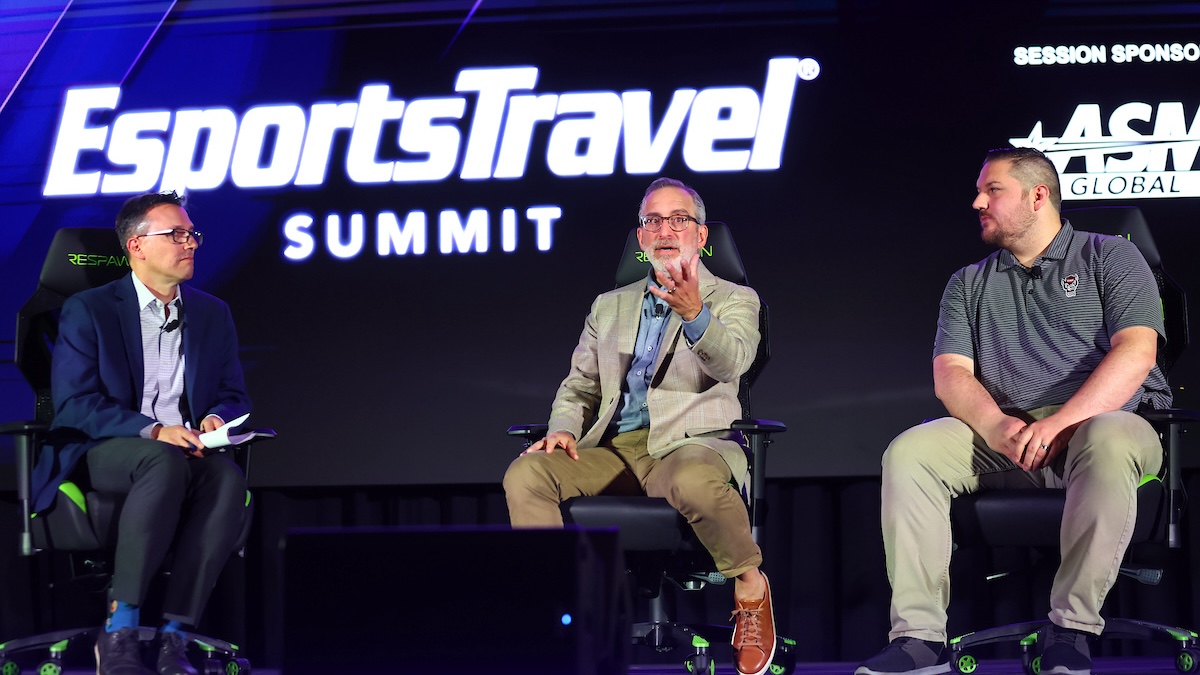
The 2024 EsportsTravel Summit at the Raleigh Convention Center covered a wide range of topics focused on the esports world. The luncheon session on May 30, “The Raleigh Esports Strategy,” featured Loren Gold, executive vice president of the Greater Raleigh Convention & Visitors Bureau, and Cody Elsen, esports program director at North Carolina State University.
Leaders in Raleigh have not only organized their esports community locally, they have helped mobilize a regional and statewide model other areas will look to replicate.
Gold and Elsen gave their expertise on how to grow an esports strategy in a destination, the lessons they’ve learned that could apply to other destinations, and best practices from a recent collegiate esports event that underscores Raleigh’s esports strategy.
“Most people understood the vision, but it’s about having a unified plan as a community that we could build out,” Gold said. “If you’re starting at zero, it’s going to take some time and a lot of meetings and visions, but you need to have a community strategy. We’re only five years into a 10-year plan and it’s already starting to bear fruit.”
Raleigh’s esports journey started in 2017 when the Greater Raleigh CVB created a destination strategic plan which identified esports as a priority future focus. Six years later, Raleigh hosted the League Championship Series Spring Finals in 2023, which featured over 12,000 total attendees, accounted for nearly 4,000 hotel room nights and created $2.7 million in direct visitor spending.
Gold mentioned the steps to become an esports destination, which starts with initiating conversation and formulating an approach. Assessment and feasibility studies must follow, including building a plan and strategy. Once the plan is set, investment must be dedicated to the proper time and resources.
“We started with an Esports 101 deck to explain it,” Gold said. “But once we showed the marketing people the amount of gamers around the world who play, we were able to get the ball rolling quickly.”
Elsen says N.C. State will have a varsity esports program in the future and the university wants to start hosting major esports events on campus. A huge piece of that puzzle is being constructed, as the Mann Hall Project is in progress. The facility when completed will include more than 10,000 square feet, 500 seats, 100-plus gaming PCs, a dedicated production room and a main stage with 12 PCs.
“The event and economic development side is really important for us,” Elsen said. “Building that venue is important to bringing esports events to N.C. State and also being able to rent the venue out to others. It’s made a big difference for N.C. State to have somebody at the university who can explain esports. Seeing the legislative support coming from the state, I knew I had to be a part of this.”
Gold explains that N.C. State has always been involved in esports and now with Elsen on the team, the university has the right person to take it to the next level.
“We now have somebody who is the point person for esports at N.C. State,” Gold said. “Cody is the gatherer of all parties. We look at it from a Raleigh space, but we also look at it from a state level and we want to get as many universities in the state involved as possible in the esports space.”
N.C. State has plans to build two mobile trucks that will be equipped with more than a dozen PCs, console setups, a competition stage and audience viewing screen. The buses can be activated anywhere, including during football tailgates or activations around the region.
“Showcasing the passion of the students is the quickest way to get the support of the administration,” Elsen explained. “We have 1,000 students involved in esports at N.C. State. And I would drag key administrators to events so they could see the crowd support and realize how big and important esports are.”











 Copyright © 2025 by Northstar Travel Media LLC. All Rights Reserved. 301 Route 17 N, Suite 1150, Rutherford, NJ 07070 USA | Telephone: (201) 902-2000
Copyright © 2025 by Northstar Travel Media LLC. All Rights Reserved. 301 Route 17 N, Suite 1150, Rutherford, NJ 07070 USA | Telephone: (201) 902-2000